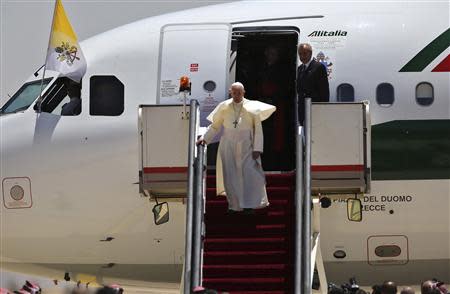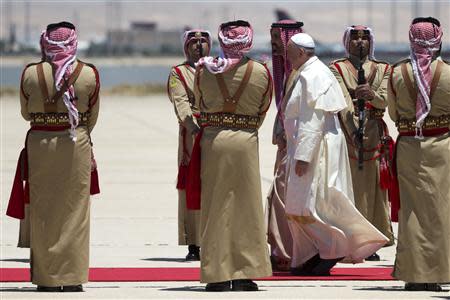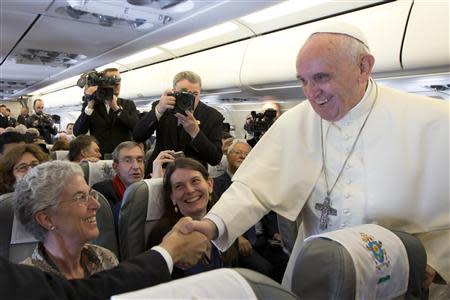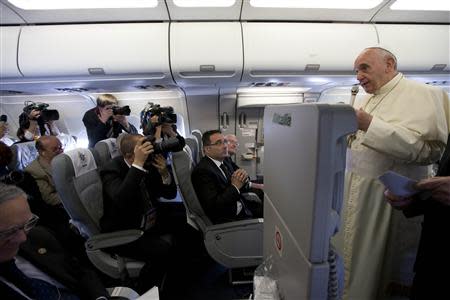Pope launches Holy Land visit with Syria peace appeal
By Philip Pullella and Suleiman Al-Khalidi AMMAN (Reuters) - Pope Francis made an urgent appeal for an end to Syria's devastating civil war and an unscripted condemnation of the arms industry on Saturday at the start of his first trip to the Holy Land as pontiff. Speaking in Jordan, Francis repeatedly stressed the need to overcome differences and press for lasting peace in the Middle East. It was a message the Argentinian pope delivered first in a speech at a royal palace, then to an open air mass, and finally and most forcefully at a church near the River Jordan where he pleaded for a political solution to Syria's "lacerating" conflict and an end to the arms trade which he said fuels war. "May the violence cease and may humanitarian law be respected, thus ensuring much needed assistance to those who are suffering," he said. "May all parties abandon the attempt to resolve issues by the use of arms and return to negotiations." More than 160,000 people have been killed in Syria's conflict and millions have fled to neighboring countries, including Jordan. Peace talks in Geneva collapsed three months ago and with no immediate prospect of their resumption, fighting continues between President Bashar al-Assad's forces and rebel fighters, both armed and reinforced by powerful international players. "May God convert those who have projects of war. May he convert weapons manufacturers and traffickers so they become constructors of peace," the pope said, departing from the prepared text of his remarks. Bombs, air strikes, gun battles and alleged chemical weapons attacks have killed 200 people daily in Syria, with government and rebel forces alike accused of atrocities. Close to three million Syrians have fled to neighboring countries. While the refugees are from all faiths, Christians feel threatened by radical Sunni Muslims now leading the military insurgency against Assad. CHRISTIAN DECLINE Francis was speaking on the first day of a delicate trip aimed at promoting an enduring peace in the Middle East and bringing hope to its dwindling Christian population. Conflict across the region, including the Arab revolts of recent years and the civil war in Syria, has accelerated a historic decline in the Christian population. In a speech to Jordan's King Abdullah and religious dignitaries in Amman, Francis said the Middle East was still plagued by "continuing grave tensions" but praised the Western-backed kingdom for its efforts to end years of conflict. "This great goal urgently requires that a peaceful solution be found to the crisis in Syria, as well as a just solution to the Israeli-Palestinian conflict," he told the monarch, whose country is one of only two Arab states to have signed a peace treaty with Israel. Key to that goal was mutual tolerance between faiths, said Francis, leader of the world's 1.2 billion Roman Catholics. "Religious freedom is in fact a fundamental human right and I cannot fail to express my hope that it will be upheld throughout the Middle East and the entire world," he said. Abdullah, whose Hashemite family traces its descent from the Prophet Mohammad, said Islam was a religion of harmony, mercy and justice, and that Jordan had worked to reject "the false claims of those who spread hatred and sow division. "Let me say, forthrightly, that Arab Christian communities are an integral part of the Middle East," Abdullah said. Following his meeting with the monarch, Francis celebrated Mass in an Amman stadium where a crowd of around 20,000 endured the heat to listen to him speak from a platform shaded by a canopy in the yellow and white colors of the Vatican, and flanked by pictures of the pope and the king. A Muslim call to prayer sounded out nearby as the pope concluded his homily, in which he stressed the need to work together to overcome divisions. "Diversity of ideas and persons should not trigger rejection or prove an obstacle," he said. Despite his plea, some expressed fears for their future in a region where Christianity is rooted. Thamer Boulus, a 45-year-old Iraqi teacher, said he fled the city of Mosul with his family because he was receiving death threats as a Christian. "I want to immigrate anywhere there is safety for me and my family. Religious extremism is threatening Christians," he said. Playing down the issue of his own security, the Vatican said before the visit that Francis wanted to travel in a normal car and would eschew bulletproof vehicles. He was driven from the airport in a modest white car and left the stadium on the back of an open-topped vehicle, from which he reached over several times to embrace people. When he reached the Jordan river, the 77-year-old pope walked down alone to the water's edge, leaning over to scoop some water onto his forehead. He stood silently for two minutes, his hands clasped in prayer, at the site where tradition says Jesus was baptized. On Sunday morning Francis flies by helicopter to Bethlehem in the Israeli-occupied West Bank. (Writing by Dominic Evans; Editing by Angus MacSwan)

 Yahoo News
Yahoo News 











